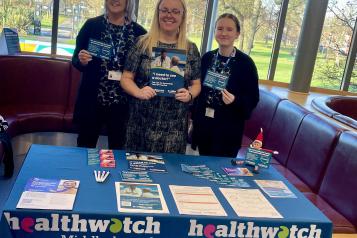Acute Respiratory Infection (ARI) Hubs

Winter weather and close indoor contact allow viruses like flu and respiratory syncytial virus (RSV) to spread more easily, resulting in more people getting unwell and placing pressure on the whole NHS, especially in GP surgeries, A&E and Urgent Treatment Centres.
These infections can be particularly serious for children, the elderly, and people with weakened immune systems, often leading to complications that require hospital care.
With more people needing help during the winter due to seasonal increases in things such as respiratory illnesses it is important to ensure appropriate and timely care can be provided to those requiring support.
What is an acute respiratory infection?
Acute respiratory infections are infections in parts of the body involved in breathing, such as the sinuses, throat, airways, or lungs. They are especially common in winter and are a major reason why people seek medical help. Typical symptoms include:
- Cough and sore throat
- Sneezing, runny or stuffy nose
- Headaches and muscle aches
- Breathlessness, chest tightness, or wheezing
- Fever or feeling generally unwell
Not all people need to seek medical help for these symptoms and many people can manage these symptoms at home using over the counter medicines, advice from a pharmacy or by contacting NHS 111. The Healthier Together App also provides useful health advice for those caring for children and young people and can be easily downloaded onto a mobile phone or tablet
What are ARI Hubs?
ARI Hubs provide specialist clinics which offer same-day, specialised care for respiratory infections, helping people who require support to be treated faster and safely cared for in the community.
Who can be referred to an ARI Hub?
ARI Hubs are available for adults and children aged 3 months and over who are experiencing winter respiratory symptoms, such as coughing, wheezing, or shortness of breath, which have started within the last seven days. If you have any of these symptoms and require extra support, you may be suitable for an appointment at an ARI Hub.
How to get an appointment at an ARI Hub
There are two ways in which you may be offered an appointment within an ARI Hub:
- By contacting NHS 111: You will be asked about your symptoms during this call and directed to the most appropriate appointment / service. This may be an ARI Hub if you are assessed as suitable, however, you also may be referred to an alternative service that is more appropriate to deal with your symptoms for example your local pharmacist, community health services and local Urgent Treatment Centre depending on your assessment at the time.
- GP Practice: Your GP reception team may offer you an appointment at your local ARI Hub, to provide you with quicker same day care, should you be considered suitable. If the ARI Hub is not the best place for you to be seen, you may be signposted to other services more suitable to your symptoms. The reception team will explain this to you.
Where are the ARI Hubs?
There are five ARI Hubs open across the Tees Valley [located in Middlesbrough, Redcar, Hartlepool, Stockton and Darlington] operating until the 19th January 2025.
If the person dealing with your enquiry thinks you need an appointment you may be offered an appointment at your nearest ARI Hub located in either Middlesbrough, Redcar, Hartlepool, Stockton or Darlington.
All appointments at ARI Hubs are face-to-face appointments and will be on the same day.
Who will I see at an ARI Hub and what I can expect in my appointment?
ARI Hubs are run by teams of local healthcare professionals, including GPs, who collaborate closely with experts in emergency care, community health, and hospital care. They will assess you during your appointment and provide the care and treatment which best meets your needs.
What should I do if my condition worsens? Call 999 if you feel that your condition has deteriorated and requires an immediate emergency response.

